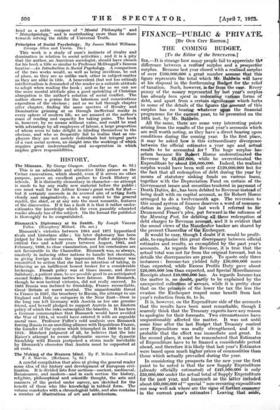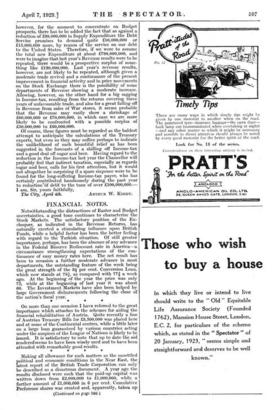FINANCE-PUBLIC & PRIVATE.
[BY OUR CITY EDITOR.]
THE COMING BUDGET.
[To the Editor of the SPEc-raxon.1 Sia,—It is strange how many people fail to appreciate the difference between a realized surplus and a prospective surplus. Because last year closed with a realized surplus of over £100,000,000 a great number assume that this figure represents the total Which Mr. Baldwin will have at his disposal in the forthcoming Budget for the relief of taxation. Such, however, is far from the case. Every penny of the money represented by last year's surplus has already been spent in redeeming various forms of debt, and apart from a certain significance which lurks in some of the details of the figures the amount of this surplus has no bearing whatever upon the financial programme for the current year, to be presented on the 16th inst. by Mr. Batdviin. All the same, there are some very interesting points arising from the results of the past year's accounts which are well worth noting, as they have a direct bearing upon conditions during the coming year. In the first place, it may be asked how is this extraordinary divergence between the official estimates a year ago and actual- results to be accounted for ? The huge surplus. has' arisen because Sir Rahert Horne underestimated the Revenue by £3,287,000, while he overestimated the Expenditure by about 08,000,000. Indeed, the realized surplus would have been well over £120,000,000 but for the fact that all redemption of debt during the year by means of statutory sinking funds on various loans, together w:th the Depreciation Fund on certain of the Government issues and securities tendered in payment of Death Duties, &c., has been debited to Revenue instead of being dealt with on capital account, as Sir Robert Horne arranged to do a twelvemonth ago. The reversion to this sound system of finance deserves a word of commen- dation in passing. Only last week I referred to Sir Drummond Fraser's plea, put forward in the columns of the Morning Post, for debiting all these redemption of debt charges to Revenue account, and it is evident that the sound views of tha Manchester banker are shared by the present Chancellor of the Exchequer. It would be easy, though I doubt if it would be profit- able, to emphasize this great discrepancy between official estimates and results, as exemplified by the ,past year's accounts. As regards the Revenue, it is true that the actual total was not far from the original forecast, but in details the discrepancies are great. To quote only three instances : Income-tax yielded fully £50,000,000 more than expected, while Excess Profits Duty gave about £26,000,000 less than expected, and Special Miscellaneous Receipts about £40,000,000 less. As regards Income-tax the matter is, no doubt, partly to be explained by the unexpected collection of arrears, while it is pretty clear that on the prineiple of the lower the tax the less the evasion the Exchequer reaped some benefit from last year's reduction from 6s. to 5s. It is, however, on the Expenditure side of the accounts that the results have been• most remarkable, though I scarcely think that the Treasury experts have any reason to apologize for their forecasts. Two circumstances have unquestionably affected the matter. It was not until some time after the last Budget that Treasury control over . Expenditure was really strengthened, and it is probable that the effect was immediate and great. In the second place, it must be remembered that Estimates of Expenditure have to be framed a considerable period ahead, and therefore it is likely that last year's Estimates were based upon much higher prices of commodities than those which actually prevailed during the year.
In considering the prospects for the new year the first point to be noted is that the new Supply Expenditure (already officially estimated) of £421,000,000 is only £38,000,000 under the actual total of Supply Expenditure for the past year, and inasmuch as the latter included about £60,000,000 of" special "non-recurring expenditure one may well ask where are the signs of further.eeenomy in the current year's estimates ! Leaving that aside, however, for the moment to concentrate on Budget prospects; there has to be added the fact that as against a reduction of £88,000,000 in Supply Expenditure the Debt Service promises to demand quite £10,000,000 or £15,000,000 more, by reason of the service on our debt to the United States. Therefore, if we were to assume the total new Expenditure at about £790,000,000, and were to imagine that last year's Revenue results were to be repeated, there would be a_prospective surplus of some- thing like £120,000,000. Last year's revenue results, however, are not likely to be repeated, although given a moderate trade revival and a continuance of the present improvement in financial activity and in price movements on the Stock Exchange there is the possibility of some departments of Revenue showing a moderate increase. Allowing, however, on the other hand for a big sagging in Income-tax, resulting from the returns covering three years of unfavourable trade, and also for a great falling off in Revenue from sales of War stores, it seems probable that the Revenue may easily show a shrinkage of /60,000,000 or £70,000,000, in which case we are more likely to be confronted with a possible surplus of 150,000,000 to £60,000,000.
Of course, these figures must be regarded as the baldest attempt to anticipate the calculations of the Treasury experts, but even so they may suffice perhaps to indicate the unlikelihood of such bountiful relief as has been suggested in the forecasts of a shilling off Income-tax and a good deal off sugar and beer. Having regard to the reduction in the Income-tax last year the Chancellor will probably feel that indirect taxation, especially as regards sugar and beer, -calls for his first attention, but it would not altogether be surprising if a spare sixpence were to be found for the long-suffering Income-tax payer, who has certainly contributed handsomely during the past year to reduction*Of delif to the tune of over £100,000,000.- I am, Sir, yours faithfully,











































 Previous page
Previous page